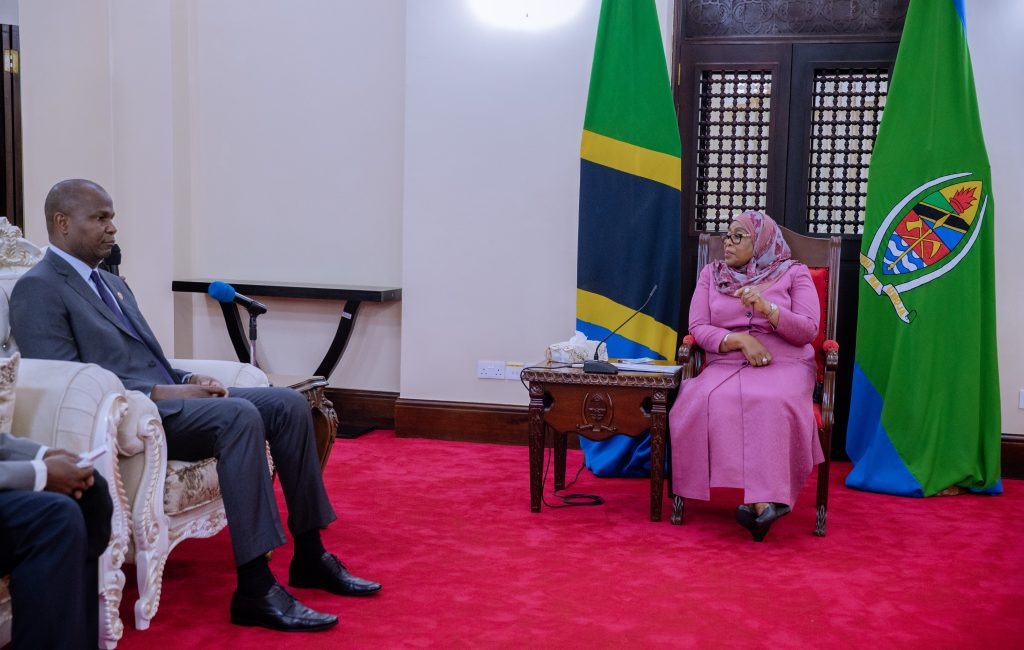Prime
What Mozambican leader’s first visit to Tanzania means

President Samia Suluhu Hassan in a meeting with the Presidential Candidate of Mozambique from the FrelimoParty, Daniel Francisco Chapo, and his delegation shortly after their official talks at the State House in Dodoma on June 12, 2024. Chapo won the election and is expected to visit Tanzania today following his victory in October 2024. FILE PHOTO | STATE HOUSE
What you need to know:
- Mozambican President Daniel Francisco Chapo arrives in Tanzania on Wednesday for a three-day state visit
Dar es Salaam. Mozambican President Daniel Francisco Chapo arrives in Tanzania on Wednesday for a three-day state visit that is expected to strengthen bilateral ties between the two countries.
His tour is expected to lay a strong foundation for economic growth, regional security and foreign investment.
This is President Chapo’s first official visit to Tanzania and only the second outside his country since assuming office in January. He visited South Africa in March.
While in Tanzania, President Chapo will hold a bilateral meeting with his host, President Samia Suluhu Hassan, and address members of the press and witness the signing of various cooperation agreements following the official welcoming ceremony.
He will also visit the African Liberation Heritage Centre to gain insight into the continent’s liberation history. President Chapo is also scheduled to tour the Standard Gauge Railway (SGR) Station in Dar es Salaam and also undertake an official visit to Zanzibar.
The visit is not only symbolic of the historical bonds between the two neighbours but also a strategic diplomatic move aimed at fast-tracking unfinished initiatives under his predecessor, Filipe Nyusi.
At the heart of discussions between presidents Hassan and Chapo is a shared commitment to revitalising bilateral trade, enhancing cross-border infrastructure and addressing security threats in the region.
Mozambique is currently targeting a 40 percent growth in foreign direct investment (FDI) this year, aiming to reach about $5.071 billion in 2025, according to the country’s proposed Economic and Social Plan and State Budget.
This would mark a significant leap from the $3.553 billion recorded in 2024, as the country leverages its vast natural gas reserves and strategic regional partnerships.
Tanzania, sharing a long land border and a maritime frontier with Mozambique, is seen as a vital partner for Mozambique, especially considering that Maputo is building a liquefied natural gas (LNG) plant to liquefy the gas that has been found in the areas close to the border with Tanzania.
Tanzania has equally found natural close to the area and plan for a similar investment project were currently at negotiation stage with investors.
“President Chapo’s visit comes at a critical time when Mozambique is strategically positioning itself to attract more capital into sectors like gas, agriculture and infrastructure.
Strengthening relations with Tanzania opens trade corridors and offers logistical advantages for exports and imports,” said an international trade expert from Mzumbe University, Dr Eunice Macha.
Although the two countries boast a long-standing history of solidarity—especially during the liberation struggles—economic cooperation has not lived up to its full potential in recent years.
In July 2024, President Hassan and former Mozambican President Nyusi discussed the need to revive bilateral trade, which had declined from $57.8 million in earlier years to just $20.1 million, largely due to informal trade and weak customs infrastructure.
One key proposal from that meeting was the establishment of modern customs centres at strategic border crossings like Mtambaswala in the Mtwara region.
President Chapo’s visit is seen as a continuation of those efforts, now with political will and renewed momentum.
“This is a classic case of a new leader picking up the baton. Chapo knows that for Mozambique to hit its FDI and economic growth targets, the trade route with Tanzania must be made more efficient and secure,” said a veteran Tanzanian diplomat, Mr Pius Josiah.
Cashew nut production and the blue economy are among the priority areas for cooperation. Both Tanzania and Mozambique are major producers of cashew nuts, and harmonising trade regulations and pricing could benefit farmers and exporters on both sides.
President Hassan has consistently advocated for setting local prices for cashews to benefit local producers, while also leveraging the blue economy for maritime trade and fisheries development. Mozambique, with its extensive coastline, shares similar aspirations.
“The alignment of interests in these sectors provides a great opportunity for joint ventures and value addition projects that could attract investors from across the region and beyond,” Dr Macha said.
President Chapo’s government has placed a high priority on stabilising Mozambique’s troubled Cabo Delgado province, where a jihadist insurgency has disrupted life and major investments, particularly in natural gas projects.
Tanzania and Rwanda are among the countries that have deployed troops to support Mozambique’s security forces. With gas exploration in Cabo Delgado—especially in the ‘Rovuma Basin’—playing a key role in FDI growth, regional security is not just a political concern, but an economic imperative.
“As a new president, Chapo needs to demonstrate results—particularly in restoring investor confidence. Collaborating with Tanzania on security matters is central to his vision,” said Mr Josiah.
Analysts believe the visit could lay the groundwork for broader integration efforts within the Southern African Development Community (SADC).
With both countries involved in various SADC trade and security platforms, stronger bilateral ties could serve as a catalyst for more harmonised regional policies.
“This visit is not just about two countries. It’s about setting an example of how regional cooperation can work in Africa—combining peace, trade, and development,” said Mr Josiah.
Expectations are high that Tanzania and Mozambique will not only sign several new cooperation agreements but also implement earlier commitments.




